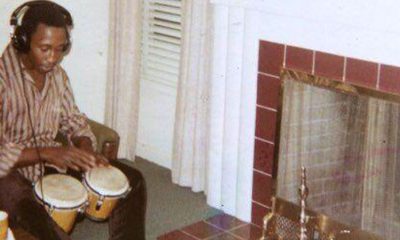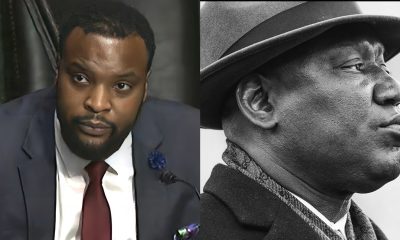National
Michael Brown’s Parents File Lawsuit Against Ferguson

Lesley McSpadden, left, and Michael Brown Sr., right, the parents of Michael Brown, listen as their attorney Anthony D. Gray speaks during a news conference Thursday, April 23, 2015, in Clayton, Mo. The parents of Michael Brown filed a wrongful-death lawsuit Thursday against the city of Ferguson, Mo., over the fatal shooting of their son by a white police officer, a confrontation that sparked a protest movement across the United States. (AP Photo/Jeff Roberson)
JIM SALTER, Associated Press
CLAYTON, Mo. (AP) — Michael Brown’s parents filed a wrongful-death lawsuit against the city of Ferguson on Thursday, opening a new chapter in the legal battle over the shooting that killed their son and sparked a national protest movement about the way police treat blacks.
Attorneys for Brown’s parents promised the case would bring to light new forensic evidence and raise doubts about the police version of events. Some of that evidence, they said, had been overlooked in previous investigations.
“The narrative of the law enforcement all across the country for shooting unarmed people of color is the same: That they had no other choice,” attorney Benjamin Crump said. “But time and time again, the objective evidence contradicts the standard police narrative.”
Brown’s parents, Lesley McSpadden and Michael Brown Sr., attended a news conference announcing the lawsuit outside the St. Louis County Courthouse. A tear rolled down McSpadden’s cheek as Crump spoke.
“It’s all part of the journey,” she said.
The case had been expected for months. If it comes to trial, the lawsuit could force a full review of all the evidence in the shooting and bring key witnesses to be questioned in open court, including Darren Wilson, the white officer who shot Brown. Wilson and former Ferguson Police Chief Tom Jackson were also named in the complaint.
Civil cases generally require a lower standard of proof than criminal cases. Jurors must base their decision on a preponderance of evidence, not proof beyond a reasonable doubt, which is the standard needed to convict in a criminal trial.
A Ferguson city spokesman declined to comment, citing the pending litigation. Messages left for an attorney for Wilson were not immediately returned.
Jackson declined to discuss the lawsuit, telling The Associated Press that he was unaware of it until a reporter told him and had not had a chance to review the allegations.
Brown, 18, was unarmed and walking in the street with a friend on Aug. 9 when Wilson told them to move to the sidewalk.
The lawsuit alleges that Wilson told the two to “get the (expletive) out of the street,” causing tension to escalate. Without the “unnecessary and unwarranted profane language,” the encounter would have been “uneventful,” it says.
Moments later, Wilson and Brown became involved in a scuffle through the open window of Wilson’s police vehicle. Wilson shot Brown after the scuffle spilled into the street.
Some witnesses said Brown appeared to be trying to surrender, but Wilson said Brown was moving toward him aggressively, forcing him to shoot.
The attorneys said they planned to cite Wilson’s own initial comments to a supervisor in which, according to the lawsuit, he said Brown had his arms raised moments before the shooting.
Brown’s death led to weeks of sometimes-violent demonstrations and spawned a national “Black Lives Matter” movement seeking changes in how police deal with minorities. In the end, local and federal authorities ruled that the shooting was justified.
In the months since Brown was killed, unarmed blacks have been fatally shot by police in Wisconsin, California, Oklahoma, South Carolina and elsewhere. Unlike Brown’s death, some of those shootings were caught on video.
A St. Louis County grand jury and the U.S. Justice Department declined to prosecute Wilson, who resigned in November. But the Justice Department released a scathing report citing racial bias and racial profiling in the Ferguson Police Department and in a profit-driven municipal court system that frequently targeted blacks.
After the report, several city officials resigned, including Jackson, the city manager and a municipal judge. The municipal court clerk was fired for racist emails, and two police officers resigned over racist emails of their own.
Crump and another attorney for the family, Daryl Parks, said the lawsuit will include evidence that was ignored by the grand jury and the Justice Department, including bullets allegedly fired by Wilson found in buildings.
Civil suits often unfold much differently than criminal matters.
Two decades ago, football star O.J. Simpson was acquitted of the slayings of his ex-wife, Nicole Brown Simpson, and her friend Ronald Goldman. But a civil jury awarded the Brown and Goldman families $33.5 million in wrongful-death damages.
The family of Amadou Diallo, an unarmed man killed by New York police in 1999, settled with the city for $3 million in 2004 after filing a $60 million lawsuit. The city did not admit any wrongdoing. The settlement came after four officers indicted in his shooting were acquitted of second-degree murder and reckless endangerment.
Wrongful-death lawsuits have been filed in other recent high-profile cases, too.
In New York, the family of Eric Garner is seeking $75 million in damages. Garner, who was black and had asthma, died in July after a white plainclothes officer applied what a medical examiner determined was a chokehold. Garner was accused of selling loose, untaxed cigarettes on a city street.
___
Associated Press Writer Jim Suhr in St. Louis contributed to this report.
Copyright 2015 The Associated Press. All rights reserved. This material may not be published, broadcast, rewritten or redistributed.
Arts and Culture
In ‘Affrilachia: Testimonies,’ Puts Blacks in Appalacia on the Map

By Terri Schlichenmeyer
The Bookworm Sez
An average oak tree is bigger around than two people together can reach.
That mighty tree starts out with an acorn the size of a nickel, ultimately growing to some 80 feet tall, with a canopy of a hundred feet or more across.
And like the new book, “Affrilachia” by Chris Aluka Berry (with Kelly Elaine Navies and Maia A. Surdam), its roots spread wide and wider.
Affriclachia is a term a Kentucky poet coined in the 1990s referring to the Black communities in Appalachia who are similarly referred to as Affrilachians.
In 2016, “on a foggy Sunday morning in March,” Berry visited Affrilachia for the first time by going the Mount Zion AME Zion Church in Cullowhee, North Carolina. The congregation was tiny; just a handful of people were there that day, but a pair of siblings stood out to him.
According to Berry, Ann Rogers and Mae Louise Allen lived on opposite sides of town, and neither had a driver’s license. He surmised that church was the only time the elderly sisters were together then, but their devotion to one another was clear.
As the service ended, he asked Allen if he could visit her. Was she willing to talk about her life in the Appalachians, her parents, her town?
She was, and arrangements were made, but before Barry could get back to Cullowhee, he learned that Allen had died. Saddened, he wondered how many stories are lost each day in mountain communities where African Americans have lived for more than a century.
“I couldn’t make photographs of the past,” he says, “but I could document the people and places living now.”
In doing so he also offers photographs that he collected from people he met in ‘Affrilachia,’ in North Carolina, Georgia, Kentucky, and Tennessee, at a rustic “camp” that was likely created by enslaved people, at churches, and in modest houses along highways.
The people he interviewed recalled family tales and community stories of support, hardship, and home.
Says coauthor Navies, “These images shout without making a sound.”
If it’s true what they say about a picture being worth 1,000 words, then “Affrilachia,” as packed with photos as it is, is worth a million.
With that in mind, there’s not a lot of narrative inside this book, just a few poems, a small number of very brief interviews, a handful of memories passed down, and some background stories from author Berry and his co-authors. The tales are interesting but scant.
For most readers, though, that lack of narrative isn’t going to matter much. The photographs are the reason why you’d have this book.
Here are pictures of life as it was 50 years or a century ago: group photos, pictures taken of proud moments, worn pews, and happy children. Some of the modern pictures may make you wonder why they’re included, but they set a tone and tell a tale.
This is the kind of book you’ll take off the shelf, and notice something different every time you do. “Affrilachia” doesn’t contain a lot of words, but it’s a good choice when it’s time to branch out in your reading.
“Affrilachia: Testimonies,” by Chris Aluka Berry with Kelly Elaine Navies and Maia A. Surdam
c.2024, University of Kentucky Press, $50.00.
Black History
Alice Parker: The Innovator Behind the Modern Gas Furnace
Born in Morristown, New Jersey, in 1895, Alice Parker lived during a time when women, especially African American women, faced significant social and systemic barriers. Despite these challenges, her contributions to home heating technology have had a lasting impact.

By Tamara Shiloh
Alice Parker was a trailblazing African American inventor whose innovative ideas forever changed how we heat our homes.
Born in Morristown, New Jersey, in 1895, Parker lived during a time when women, especially African American women, faced significant social and systemic barriers. Despite these challenges, her contributions to home heating technology have had a lasting impact.
Parker grew up in New Jersey, where winters could be brutally cold. Although little is documented about her personal life, her education played a crucial role in shaping her inventive spirit. She attended Howard University, a historically Black university in Washington, D.C., where she may have developed her interest in practical solutions to everyday challenges.
Before Parker’s invention, most homes were heated using wood or coal-burning stoves. These methods were labor-intensive, inefficient, and posed fire hazards. Furthermore, they failed to provide even heating throughout a home, leaving many rooms cold while others were uncomfortably warm.
Parker recognized the inefficiency of these heating methods and imagined a solution that would make homes more comfortable and energy-efficient during winter.
In 1919, she patented her design for a gas-powered central heating system, a groundbreaking invention. Her design used natural gas as a fuel source to distribute heat throughout a building, replacing the need for wood or coal. The system allowed for thermostatic control, enabling homeowners to regulate the temperature in their homes efficiently.
What made her invention particularly innovative was its use of ductwork, which channeled warm air to different parts of the house. This concept is a precursor to the modern central heating systems we use today.
While Parker’s design was never fully developed or mass-produced during her lifetime, her idea laid the groundwork for modern central heating systems. Her invention was ahead of its time and highlighted the potential of natural gas as a cleaner, more efficient alternative to traditional heating methods.
Parker’s patent is remarkable not only for its technical innovation but also because it was granted at a time when African Americans and women faced severe limitations in accessing patent protections and recognition for their work. Her success as an inventor during this period is a testament to her ingenuity and determination.
Parker’s legacy lives on in numerous awards and grants – most noticeably in the annual Alice H. Parker Women Leaders in Innovation Award. That distinction is given out by the New Jersey Chamber of Commerce to celebrate outstanding women innovators in Parker’s home state.
The details of Parker’s later years are as sketchy as the ones about her early life. The specific date of her death, along with the cause, are also largely unknown.
Activism
U.S. House Minority Leader Hakeem Jeffries Speaks on Democracy at Commonwealth Club
Based on his first speech as House minority leader, “The ABCs of Democracy” by Grand Central Publishing is an illustrated children’s book for people of all ages. Each letter contrasts what democracy is and isn’t, as in: “American Values over Autocracy”, “Benevolence over Bigotry” and “The Constitution over the Cult.”

By Linda Parker Pennington
Special to The Post
House Minority Leader Hakeem Jeffries addressed an enthusiastic overflow audience on Monday at San Francisco’s Commonwealth Club, launching his first book, “The ABCs of Democracy.”
Based on his first speech as House minority leader, “The ABCs of Democracy” by Grand Central Publishing is an illustrated children’s book for people of all ages.
Each letter contrasts what democracy is and isn’t, as in: “American Values over Autocracy”, “Benevolence over Bigotry” and “The Constitution over the Cult.”
Less than a month after the election that will return Donald Trump to the White House, Rep. Jeffries also gave a sobering assessment of what the Democrats learned.
“Our message just wasn’t connecting with the real struggles of the American people,” Jeffries said. “The party in power is the one that will always pay the price.”
On dealing with Trump, Jeffries warned, “We can’t fall into the trap of being outraged every day at what Trump does. That’s just part of his strategy. Remaining calm in the face of turmoil is a choice.”
He pointed out that the razor-thin margin that Republicans now hold in the House is the lowest since the Civil War.
Asked what the public can do, Jeffries spoke about the importance of being “appropriately engaged. Democracy is not on autopilot. It takes a citizenry to hold politicians accountable and a new generation of young people to come forward and serve in public office.”
With a Republican-led White House, Senate, House and Supreme Court, Democrats must “work to find bi-partisan common ground and push back against far-right extremism.”
He also described how he is shaping his own leadership style while his mentor, Speaker-Emeritus Nancy Pelosi, continues to represent San Francisco in Congress. “She says she is not hanging around to be like the mother-in-law in the kitchen, saying ‘my son likes his spaghetti sauce this way, not that way.’”
-

 California Black Media4 weeks ago
California Black Media4 weeks agoCalifornia to Offer $43.7 Million in Federal Grants to Combat Hate Crimes
-

 Black History4 weeks ago
Black History4 weeks agoEmeline King: A Trailblazer in the Automotive Industry
-

 California Black Media4 weeks ago
California Black Media4 weeks agoCalifornia Department of Aging Offers Free Resources for Family Caregivers in November
-

 California Black Media4 weeks ago
California Black Media4 weeks agoGov. Newsom Goes to Washington to Advocate for California Priorities
-

 Activism3 weeks ago
Activism3 weeks agoOakland Post: Week of November 27 – December 3, 2024
-

 Activism4 weeks ago
Activism4 weeks agoOCCUR Hosts “Faith Forward” Conference in Oakland
-

 Activism4 weeks ago
Activism4 weeks agoRichmond Seniors Still Having a Ball After 25 Years
-

 Activism2 weeks ago
Activism2 weeks agoButler, Lee Celebrate Passage of Bill to Honor Congresswoman Shirley Chisholm with Congressional Gold Medal





















































